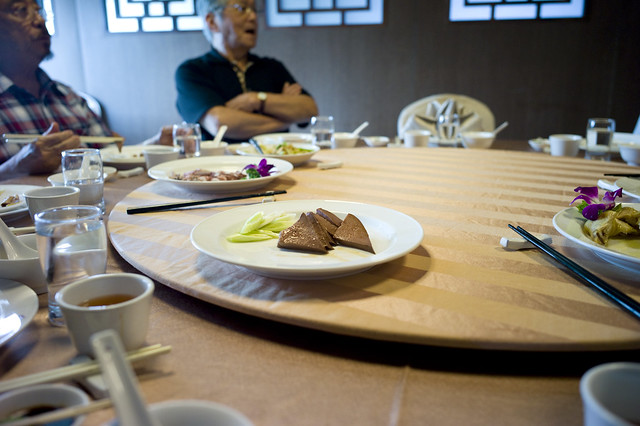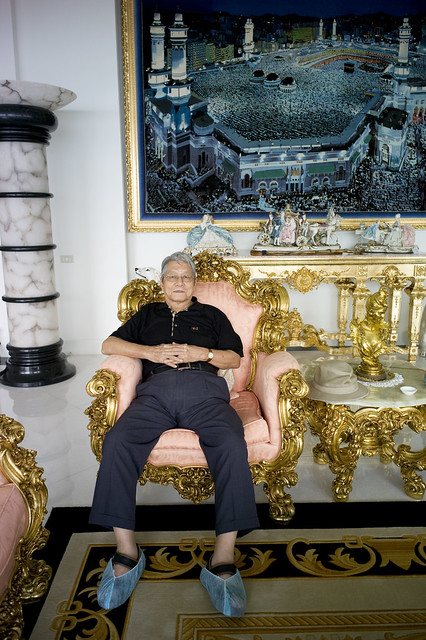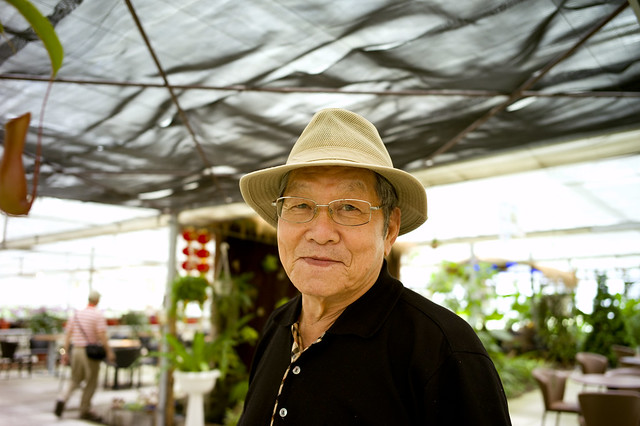
*When I think of my grandfather, I think of his square jawline and his tanned skin, the hearty laugh and underbite that earned him the nickname “Bulldog,” his obscenely early bed time and his love for golf, which is the reason he still wakes up at 4 am every day without fail, even at 82 years old. I see him in the white tank top that he wears when he’s at home reading on the couch; most of all, I see him happily feasting at our large family dinners, where most of his energy is spent encouraging everyone else to eat more, as Asian elders tend to do to the ones they love.
*Of course, I really only see my grandfather once every few years, when I visit Taipei, where he lives. His trips to California are less frequent than they once were, though his stamina is still impressive for his age. The last time he was here, my mother complained that he relentlessly tried to polish off everyone else’s meals at The Cheesecake Factory, even as he was clutching his own stomach in pain. Despite being told that Cheesecake Factory portions are inhumanly large and that it was okay not to finish all the food on the table, my grandfather couldn’t help it; he grew up in Taiwan when it was under Japanese rule and has since maintained a wartime mentality toward food, despite eating very well, regularly.
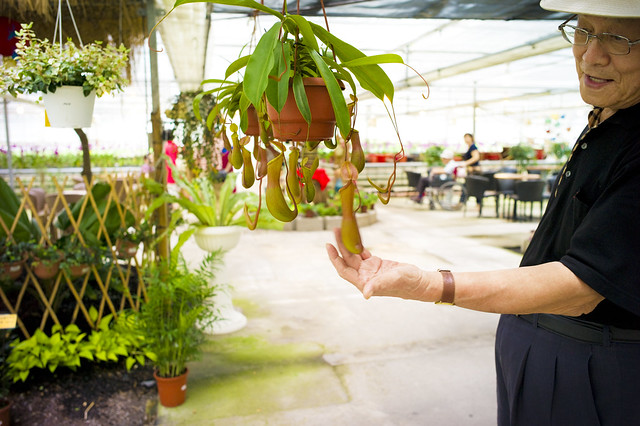
*If this wartime mentality of scarcity is the reason why my grandfather feels instinctively compelled to finish every morsel of food, I’m sure that this mentality is also the reason he eats with such gusto and joy. In part, at least. I do believe that my grandfather, like me, has a genetically predisposed fanaticism towards food, which is mere sustenance for everyone else who doesn’t. But then again, whereas I’ve always had the luxury of being picky about what I eat, there was a time in my grandfather’s life—for much of it actuall—when food was merely sustenance because it had to be. There was no choosing what to eat because eating was a matter of survival. My grandfather was the fourteenth of sixteen siblings (eight boys, eight girls, all from the same mother and father!), and in a family with so many mouths to feed, abundance was a pipe dream. Now that food is no longer scarce, he treats every meal as feast, never allowing eating to be solely the breaking of a fast.
*One of my favorite foods is the sweet potato, a food my grandfather refuses to eat. The Japanese sweet potato, yaki-imo, was a wartime staple that he ate as a child; it is a food that reminds him of dearth and poverty, so he doesn’t eat it anymore.
*When I visited Taiwan as a child, he’d take me out—just me and him—and we’d go eat pig’s feet, his favorite dish, which had been stewed for hours in a sweet, dark soy sauce. The pig’s feet were mostly collagen, tender, chewy, and fatty skin, with just a little meat around the bone. It was never in a fancy place, and the pig’s feet would be served on a scratched up platter, with no garnish, just sauce.
He always reminisces about this when he sees me. It’s
something to talk about, a good memory we have together, but I also think it
reminds him of why he took me to go eat pig’s feet in the first place: because
that ten year old girl ate as voraciously and as joyously as he did. Rare are
ten year olds who will happily devour porcine trotters as I did.
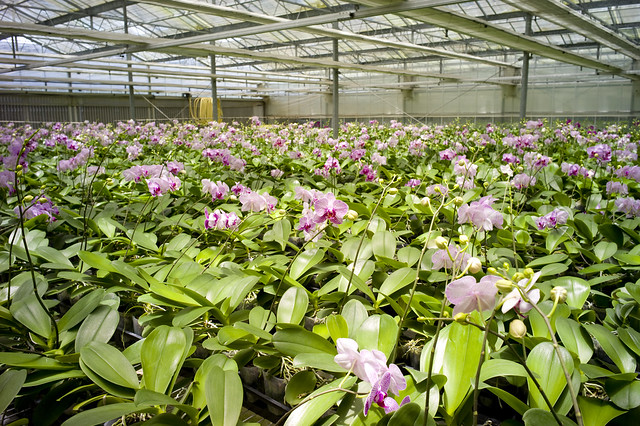
*In June, I spend a few days at my grandparents’ house in
Taipei. I speak Mandarin decently, but not fluently enough to have the kinds of
intimate conversations I’ve always wanted to have with my grandparents. So it
is as it was twelve years ago, when our most intimate gestures are communicated
with food. “What do you want to eat?” is the first question I’m asked when I
arrive in Taiwan. The first night we have Japanese food, and I’m barraged with
literal boatloads of sashimi.
*On one of my final days in Taiwan, my grandfather takes me
out for a special trip to the coast of Taiwan. First we drive to what my mother
insists is a phoenix farm. “Mom, a phoenix is a mythical animal. They don’t
exist.” We argue about this for the entire car ride, and later I find out that
what we’re actually seeing is crested arguses. After
the crested arguses, we go to an orchid farm, and
I can tell that my grandfather is trying to impress me by showing me the most
wondrous things that Taiwan has to offer (exotic birds! exotic plants!). But
despite the novelty of crested arguses and orchids, something about this
morning feels forced; I feel like a foreign ambassador touring another country.
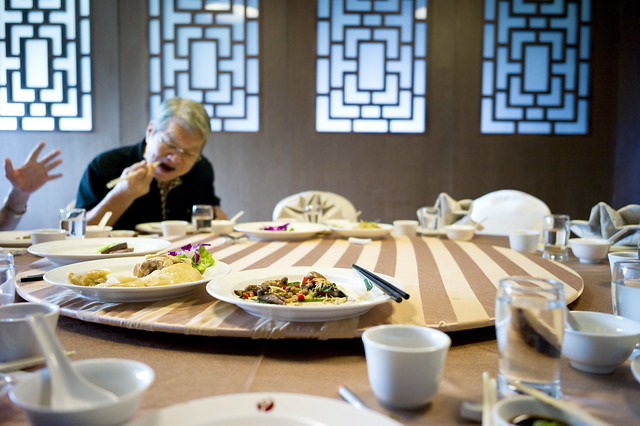
*After the two farms, we finally arrive at a department store in a small, dusty town, and we ride the elevator to the top, to an empty restaurant owned by my grandfather’s friend. I can sense that he is feeling more comfortable and more at ease. We sit down to eat, and plates of food begin to arrive. Local specialties abound: wild plants I’ve never heard of, fish that are native to the Taiwan coast, shark jowls, marinated pork kidneys, eels, fried buns. Most of the food is stewed, salty, and oily, strongly flavored so that white rice is absolutely necessary. I see my grandfather in his element, carefully monitoring the flow of food to the table and the distribution of it among everyone around it. This is a responsibility he takes seriously, making sure everyone is happily eating and well-fed, if not overly fed, by the end of the meal.
*I sit at the table, simultaneously intrigued by all the
delicacies and overwhelmed by both the novelty and variety. I see my
grandfather shooting me glances every time my plate is empty, and he spins the
lazy susan in my direction repeatedly, urging me to eat more.
*“I used to take her to eat pig’s feet,” he says proudly to
his friend, as he eats another slice of pork kidney. It’s a simple, anecdotal
statement, really—but what he means to say is that we’re close; he means that
we understand each other.Most of all, he’s telling his friend that by eating
and sharing food together, those pig’s feet especially, we’re also inextricably
bound, through famine and feast, through scarcity and abundance.
